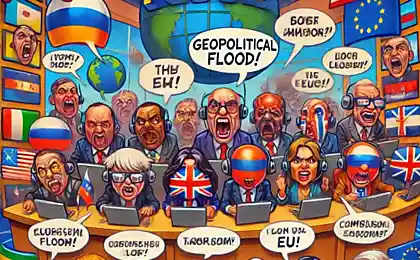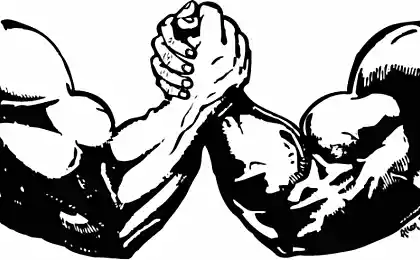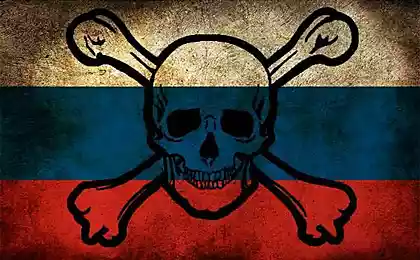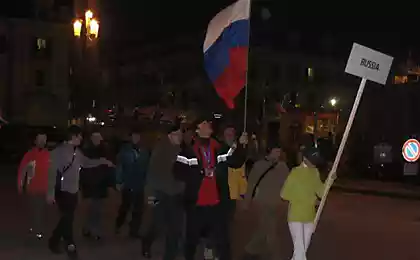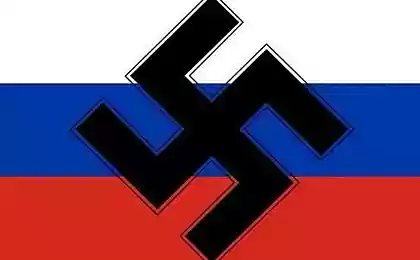999
What words are taught to foreigners in the first place
Spanish teacher from Argentina, tango dancer, an architect from Greece, Singapore student, an economist from France and a tourist from China told The Village, which is necessary to learn Russian words in the first place, that, being in Russia, not to get into ridiculous situations.
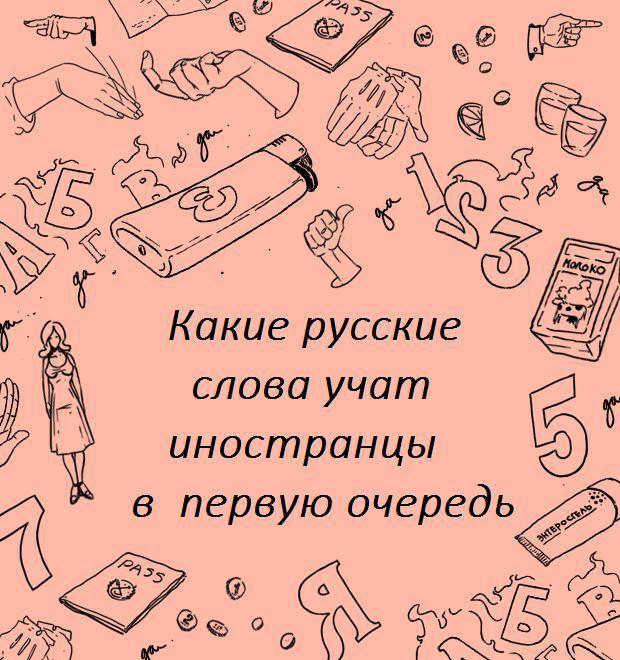
1-10
Figures in Moscow even necessary words. Especially if you drive a taxi, especially if unofficial taxi. Very often, drivers are trying to take a foreigner anymore, so learn the numbers and make an amount in advance. Russian letters, incidentally, is also useful: to read the names and addresses of the metro stations. Because all signs in Moscow only in Cyrillic.
Damn
I just can not stop saying "damn!". And I certainly do not mean the food. Russian interjection used it in very different situations.
Where
Very useful word, for example, when you need to find something. It is convenient, because with it does not necessarily consume more of some verb, just added to the "where" name of the place, the food or the subway station. People immediately understand what you want from them, and help.
Yes, yes, yes
I noticed this expression in Russian friends even before they moved to Russia. Noticed that they never say simply "yes", and the word is repeated three or four times. And the first word certainly sounds longer than the others. Take into account such details - the best way to sound "in Russian" (and I personally have such a goal). In this phrase, no one will notice the emphasis: just nods his head and says it at the right pace.
No, probably
What the hell does that mean? Yes, no or maybe? I once worked in the mountains in Chechnya and asked my director if he knows when we need to start shooting video. And he answered me so. I was puzzled. In fact, people in Moscow all the time so they say, and it means "I do not know", although a bit more complicated than just "do not know».
Dear friends
I still do not understand why it is always polite treatment of gay people. But I appeal to friends, they like. In general, you need to know all the basic polite words: "thank you", "please" and so on. Not just to be polite, as is customary in other countries. Just Russian people are very special in communication: if you try to talk to them in their language and with a smile, they react differently to become more friendly.
Woman / girl
"Woman" - one of the most common nouns that I immediately heard - on the streets of Moscow to all so treated, so it's best to learn this word, so you do not shy away. Well, the "girl" more useful.
Lighter
Very handy for those foreigners who smoke. I had also smoked, and when he first came to Moscow, then at the request of a light literal translation of a phrase from the French, it turned out, "Fire, please." Of course, I have always understood, but laughed a lot.
Here / there
These and other words that indicate the direction - right, left, right - I learned specifically to communicate with taxi drivers (especially illegal). Taxi drivers in Moscow never know where to go. We have to help.
Of course
Russian very often use this word. It sounds cool. Especially when you have no idea what was going on, you can just say "of course!" - And it will look like you're fluent in Russian. In addition, this is another way to agree with someone. Just do not confuse it with the word "end" of the ads in the subway: remember once I was very surprised to hear "station" Novogireevo ", of course. Stag Night ».
Okay
This word is worth remembering not to talk all the time only "yes" or "ok" to confirm. People at him warmly respond.
You can
Irreplaceable word when you need to ask anything. It does not need a verb that everything is much easier. Just say "can" and the name of what, well, or your finger, if you do not know. And yet, for example, it is suitable to attract the attention of the waiter politely: "You can?»
Milk / yogurt
The store is the biggest problem with these products. Need to know not only how to pronounce, but also how to write these words. Coffee and tea you will never be confused, but milk and yogurt are usually sold in exactly the same packages or bottles - they are very easy to mix up, believe me.
Well
From the very beginning I was baffled word "well". For the most part due to the fact that a few months I taught Romanian language and in translation from a "well" means "no." Russian always use the word, especially in terms of "yes." And for me it always sounds like "no yes».
Gloves
My favorite word. Probably because it's cold and I always mёrznu. And also because I always lose things. But I really like to ask loudly: "Where are my gloves?" I understand that it is easier to have a spare pair than every time try to pronounce the word correctly, but still.
Beer
I am convinced that the book needed a drink in the bar only in the language, which in this country are saying. This is more important than any other greetings and basic words. With vodka everything is simple, but the "beer" has a very bartender - he will not be cheating.
Hangover
And "freshen the nip" and "snacks". All of these words are associated with drinking and so beautiful that should be exported into all languages. In the first week of my stay in Moscow friends invited me to drink vodka. They did not speak in English, but that did not stop us first drink in the restaurant and bar, eating eggs, then herring (I like very much). Then we went to visit one more friend, where they continued to drink vodka, eating cheese and communicating through Google Translate. In general, I was sleeping on the floor in the morning and was very surprised, having met the grandmother of one of the friends who cooked us breakfast and called me "baby." And then she gave me a beer! I was shocked.
Register
The first word in my list because it involves a lot of problems. One day I spent in the queue unsuccessfully four hours to get this same registration. All frightened me and assured me that I have to get it. After a while I stopped worrying. Learned in addition to the "registration" expression "eaten a dog" in the hope that the police will seem funny. When I was still stopped, the policeman is not amused - but they were rooting for "Spartacus", and in this team three Argentine, so we talked about football, and they let me go.
Letting
What usually never have had the same taxi. So if you call a car, try to carry a small money.
Seriously
Learning Russian - not an easy task, but it can make a very fascinating. In short, «fake it until you make it»: you should try to talk as much as possible even with a minimal vocabulary. For example, there is a very significant statement "seriously" - after someone has completed the sentence. Here is the importance of context - a word can be pronounced with the intonation of surprise, so if you understand everything, but you can not believe.
Help
Very typical for Moscow word. Without it, for example, can not get into the pool. It's such a paper, which states that you are healthy and you can swim (people usually buy it for three hundred rubles). Do not forget to bring it to the pool every time, if you do not want to spend an hour on the survey at the local doctor angrily. This has happened to me.
Enough plump
I read it on a poster that hung on one of the houses in St. Petersburg. I knew right away that it is a universal phrase for Russia, especially to pursue an appeal: "Dear friends, enough to thump!»
Good
This word is much easier for you to live in Moscow. And it can be used as a comment and a question. In fact, by using the word one can build a whole dialogs - it sounds idiotic, but everyone understands.
Th
People in Moscow often say that, as I later realized - instead say "that." I heard it all the time, and when I was told that it could be in the interrogative sentence and use, he gradually began to speak. In general, this base - just remember.

1-10
Figures in Moscow even necessary words. Especially if you drive a taxi, especially if unofficial taxi. Very often, drivers are trying to take a foreigner anymore, so learn the numbers and make an amount in advance. Russian letters, incidentally, is also useful: to read the names and addresses of the metro stations. Because all signs in Moscow only in Cyrillic.
Damn
I just can not stop saying "damn!". And I certainly do not mean the food. Russian interjection used it in very different situations.
Where
Very useful word, for example, when you need to find something. It is convenient, because with it does not necessarily consume more of some verb, just added to the "where" name of the place, the food or the subway station. People immediately understand what you want from them, and help.
Yes, yes, yes
I noticed this expression in Russian friends even before they moved to Russia. Noticed that they never say simply "yes", and the word is repeated three or four times. And the first word certainly sounds longer than the others. Take into account such details - the best way to sound "in Russian" (and I personally have such a goal). In this phrase, no one will notice the emphasis: just nods his head and says it at the right pace.
No, probably
What the hell does that mean? Yes, no or maybe? I once worked in the mountains in Chechnya and asked my director if he knows when we need to start shooting video. And he answered me so. I was puzzled. In fact, people in Moscow all the time so they say, and it means "I do not know", although a bit more complicated than just "do not know».
Dear friends
I still do not understand why it is always polite treatment of gay people. But I appeal to friends, they like. In general, you need to know all the basic polite words: "thank you", "please" and so on. Not just to be polite, as is customary in other countries. Just Russian people are very special in communication: if you try to talk to them in their language and with a smile, they react differently to become more friendly.
Woman / girl
"Woman" - one of the most common nouns that I immediately heard - on the streets of Moscow to all so treated, so it's best to learn this word, so you do not shy away. Well, the "girl" more useful.
Lighter
Very handy for those foreigners who smoke. I had also smoked, and when he first came to Moscow, then at the request of a light literal translation of a phrase from the French, it turned out, "Fire, please." Of course, I have always understood, but laughed a lot.
Here / there
These and other words that indicate the direction - right, left, right - I learned specifically to communicate with taxi drivers (especially illegal). Taxi drivers in Moscow never know where to go. We have to help.
Of course
Russian very often use this word. It sounds cool. Especially when you have no idea what was going on, you can just say "of course!" - And it will look like you're fluent in Russian. In addition, this is another way to agree with someone. Just do not confuse it with the word "end" of the ads in the subway: remember once I was very surprised to hear "station" Novogireevo ", of course. Stag Night ».
Okay
This word is worth remembering not to talk all the time only "yes" or "ok" to confirm. People at him warmly respond.
You can
Irreplaceable word when you need to ask anything. It does not need a verb that everything is much easier. Just say "can" and the name of what, well, or your finger, if you do not know. And yet, for example, it is suitable to attract the attention of the waiter politely: "You can?»
Milk / yogurt
The store is the biggest problem with these products. Need to know not only how to pronounce, but also how to write these words. Coffee and tea you will never be confused, but milk and yogurt are usually sold in exactly the same packages or bottles - they are very easy to mix up, believe me.
Well
From the very beginning I was baffled word "well". For the most part due to the fact that a few months I taught Romanian language and in translation from a "well" means "no." Russian always use the word, especially in terms of "yes." And for me it always sounds like "no yes».
Gloves
My favorite word. Probably because it's cold and I always mёrznu. And also because I always lose things. But I really like to ask loudly: "Where are my gloves?" I understand that it is easier to have a spare pair than every time try to pronounce the word correctly, but still.
Beer
I am convinced that the book needed a drink in the bar only in the language, which in this country are saying. This is more important than any other greetings and basic words. With vodka everything is simple, but the "beer" has a very bartender - he will not be cheating.
Hangover
And "freshen the nip" and "snacks". All of these words are associated with drinking and so beautiful that should be exported into all languages. In the first week of my stay in Moscow friends invited me to drink vodka. They did not speak in English, but that did not stop us first drink in the restaurant and bar, eating eggs, then herring (I like very much). Then we went to visit one more friend, where they continued to drink vodka, eating cheese and communicating through Google Translate. In general, I was sleeping on the floor in the morning and was very surprised, having met the grandmother of one of the friends who cooked us breakfast and called me "baby." And then she gave me a beer! I was shocked.
Register
The first word in my list because it involves a lot of problems. One day I spent in the queue unsuccessfully four hours to get this same registration. All frightened me and assured me that I have to get it. After a while I stopped worrying. Learned in addition to the "registration" expression "eaten a dog" in the hope that the police will seem funny. When I was still stopped, the policeman is not amused - but they were rooting for "Spartacus", and in this team three Argentine, so we talked about football, and they let me go.
Letting
What usually never have had the same taxi. So if you call a car, try to carry a small money.
Seriously
Learning Russian - not an easy task, but it can make a very fascinating. In short, «fake it until you make it»: you should try to talk as much as possible even with a minimal vocabulary. For example, there is a very significant statement "seriously" - after someone has completed the sentence. Here is the importance of context - a word can be pronounced with the intonation of surprise, so if you understand everything, but you can not believe.
Help
Very typical for Moscow word. Without it, for example, can not get into the pool. It's such a paper, which states that you are healthy and you can swim (people usually buy it for three hundred rubles). Do not forget to bring it to the pool every time, if you do not want to spend an hour on the survey at the local doctor angrily. This has happened to me.
Enough plump
I read it on a poster that hung on one of the houses in St. Petersburg. I knew right away that it is a universal phrase for Russia, especially to pursue an appeal: "Dear friends, enough to thump!»
Good
This word is much easier for you to live in Moscow. And it can be used as a comment and a question. In fact, by using the word one can build a whole dialogs - it sounds idiotic, but everyone understands.
Th
People in Moscow often say that, as I later realized - instead say "that." I heard it all the time, and when I was told that it could be in the interrogative sentence and use, he gradually began to speak. In general, this base - just remember.

